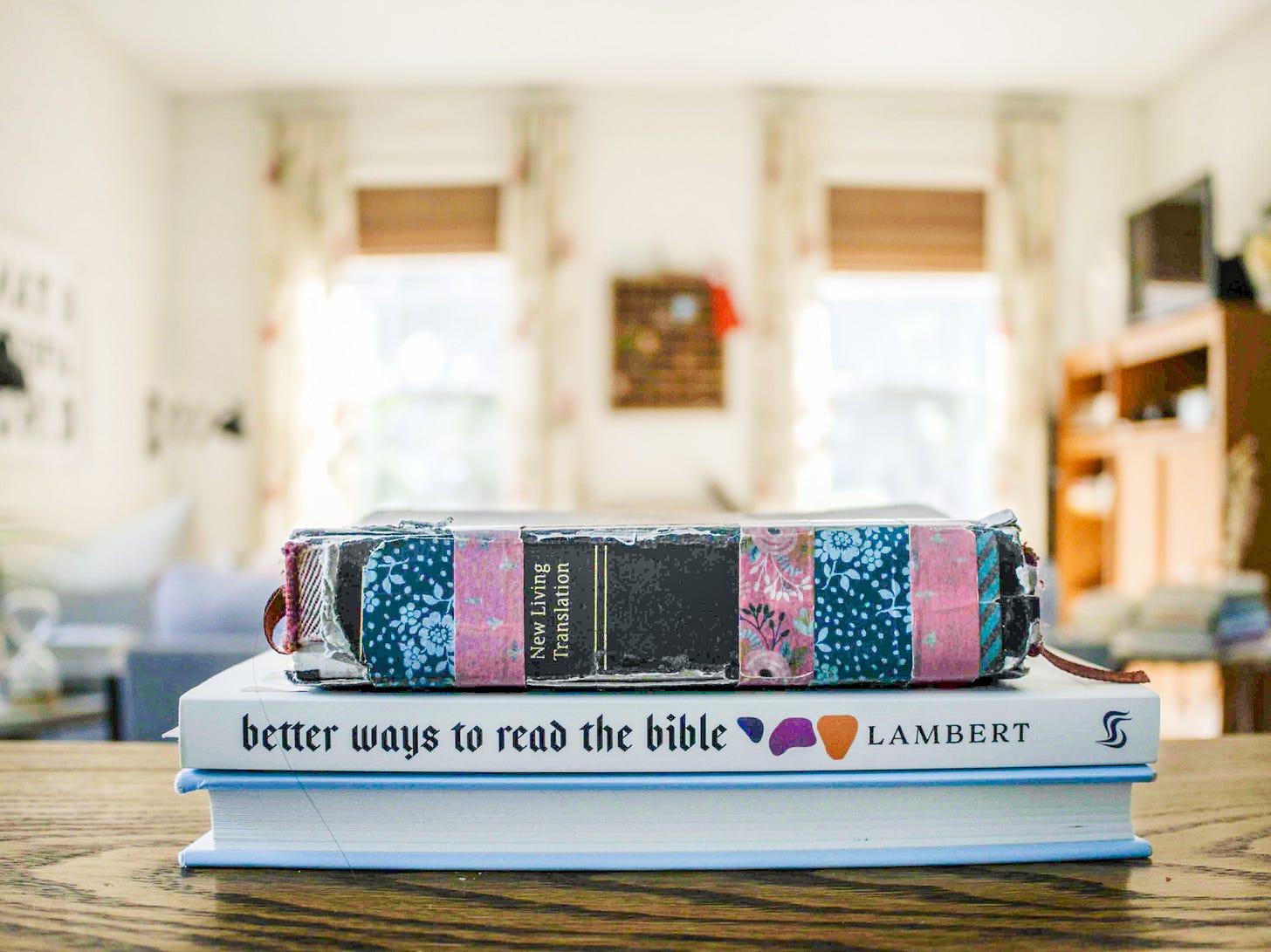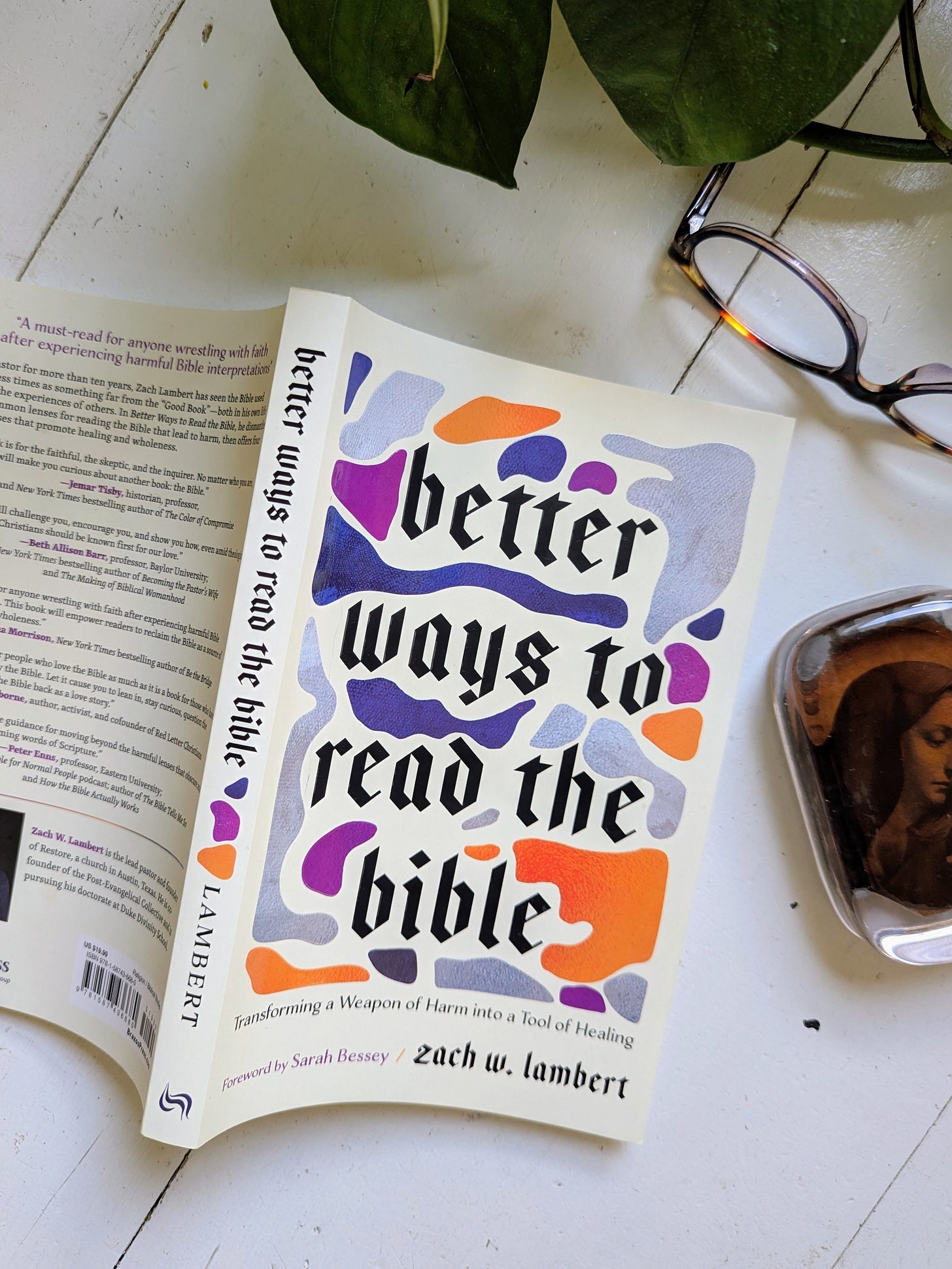Why I Stopped Reading the Bible
on the mass weaponization of Love, my crisis-point, and how I recovered
Several years ago, I stopped reading the Bible.
It crept up on me, as I’d always been warned. But nothing could have prepared me for the reasons.
A few things were happening as my Bible started to collect dust.
First, someone I love was navigating the process of understanding and owning the fullness of who they were as a member of the LGBTQ+ community. At that time the acronym was shorter and many of us were much less familiar and comfortable with the conversation. As it became more personal to me, my boilerplate theology required what felt like impossible, devastating choices for everyone involved.
This whole scenario rang out in a key similar to the Christian call to arms around abortion, in which entire voting blocs/denominations/ideologies were entwined with “the unborn” - a population that was wondrously silent, compliant, invisible, and pure. What had always felt so simple had become complicated by my relatively new proximity with people who grew up out past my White, middle class, Evangelical bubble.
I started to notice how seamlessly many who fought for “the unborn” turned around and vilified poor, single moms who “chose life”. From one side of their mouths, they claimed moral outrage and pious heartbreak over abortion. From the other side, they lobbed judgments like, “If you can’t afford babies, don’t have them!”
Once again, I saw people I loved in the crosshairs of this church-sanctioned hypocrisy.
“We must find better ways to read the Bible than as a caste system starter kit.”
As someone with a deep history in Conservative politics, as we headed into the 2016 election, I knew Trump was going to win. For perhaps the first time, I hated being right.
I will not revisit the ways Trump’s influence over the country, the White Evangelical church, and some of the most formative people in my life coalesced into personal and collective crisis. I will simply say this: my refusal to abandon my Sermon on the Mount values for the sake of Donald Trump came at a cost. My scheduled speaking events cancelled on me in rapid succession then dried up almost entirely. My public platform shifted dramatically. Family members and spiritual heroes unfollowed me, or worse. The impact was both disorienting and consuming.
In a relatively short span of time, the Bible I’d been taught to revere had been warped into terrible news. Reading it, even thinking about reading it, made my breath catch in my throat and my hands shake. During what expanded into my dark era of the soul, it was easier to avoid it altogether.
The complication, of course, was Jesus.
Even as I struggled to make eye contact with my Bible, I did my best to walk alongside him. He was woven into the fabric of my identity and the ways I moved through the world. He was my North Star, illuminating every core decision - where I lived, how I lived, my values and habits around money, my posture toward those I who lived and believed differently, my civic responsibilities. All of it.
“The way of Jesus always leads to healing, not harm.”
In 2022, I published my third book, Start with Hello, a field guide for how to love our neighbor. In the world of Amazon rankings, my book competed with (and lost against) another Christian release titled The Case for Christian Nationalism.
Let that sink in.
Two years later, DJT was elected President for the second time and Christians grew more comfortable being cruel in broad daylight. Trump effectively baptized the malice that had been kept under wraps in certain spaces. My despair ballooned.
I invited honest conversation with someone I respected, trying to understand how they could so full-throatedly support a man who was abusive, especially toward women, especially toward women of color. “Oh, get over it!” this once-kindhearted person grinned, adding, “I don’t care what he does as long as the economy is good.”
Their God had not changed. Their Bible had not changed. They had not even changed, I’m convinced. But something had to give. And so, their definition of love changed.
Across the 83% of White Evangelicals who voted Trump into office, love was no longer bound by the constraints of being loving. In that upside-down kingdom of Christian Nationalism, old love was for crybabies. Now, under their banner, “real” love was weaponized into exclusion, retribution, and even hate. This was the “throw them out with the trash” sort of “love” that had broken families and heart and bodies and dignity across history and had now become a brand.
“It’s not loving to let immigrants come to America ‘the wrong way,’ dishonest people mused. It’s not loving to allow them (immigrants, the unhoused, people suffering from addiction, the incarcerated, the poor…) to behave so badly, to be so damn needy, to be in our way, to exist in our sightline.
Weeks after DJT’s second inauguration, someone close to me reached out, essentially ending (or at least irreparably altering) our relationship. They accused me of being “woke” and not caring enough when others questioned my politics or cut ties with me. “It feels harsh and unloving,” they said, that I did not opt to silence my beliefs that so grieved our Conservative brethren.
Two days later, an Amazon package arrived, with a hot new release by a popular female Christian Nationalist author. Its entire premise was to cast empathy in a new and sinister light. It arrived with this anonymous gift receipt:
I read the book cover to cover, underlining the most egregious passages and scribbling notes in the margins. It’s hard to understate the damage a wealthy, powerful, attractive, White Evangelical woman wields when she opens (page xviii) with an 8-page diatribe against George Floyd and the narrative around his murder. (Spoiler - she does not buy the “murder” charge.) Her key thesis: “How could I know Derek Chauvin’s heart?” and, “how did I know the situation had anything to do with race?”
She details how she was able to rise above her initial gut reaction of sympathy to a higher plane of healthy “Christian” skepticism and brags about the courage required to express this alternate “truth.” She rewrites the official legal record, ripping the frame from events that led up to the murder, casting the details as “murky” and unknowable. She then predictably turns her focus to the “rioters,” reminds readers that they need not dignify accusations of racism with a response, and wraps it all in a flourish of abject victimhood. We are the oppressed. No one deserves what we have. We must fight to keep what’s ours. (my paraphrase)
Beware powerful people who cosplay as victims. Beware popular, wealthy, Christian influencers and leaders who separate, exclude, and condemn truly marginalized Image-bearers while remaining silent (at best) about DJT’s moral bankruptcy. At a time when this is the status quo, it’s easy to understand why people want to run in the opposite direction.
The crisis was complete. Now what?
This week, I spent several soul-settling hours on the back patio reading Zach Lambert’s new release, Better Ways to Read the Bible: Transforming a Weapon of Harm into a Tool of Healing. In it, he dismantles common biblical lenses that perpetuate shame, judgment, moralism, detachment, and hierarchy. He also offers a fresh perspective on better, theologically-rigorous lenses that promote healing and flourishing.
I devoured his words and the actual love of God they represent.
Over the past year or so, I’ve wandered back into reading my Bible again, mostly thanks to the clarity and perspective gained by studying in a communal context at Holy Alliance. With relief, I’ve found that my lens has changed. I no longer believe God is mad at me, or waiting to smite me, or (worst of all) asking me to hurt someone in Christian “love.”
I wish I could have read Zach’s book decades ago, yet I trust now is the next best option. I have a feeling it might be a balm to you, too. If you feel that your faith has left you with impossible choices that require you to set aside the expansive love of Jesus, Better Ways to Read the Bible offers a liberating perspective.
If you feel despondent most days over the wide reach of Christian Nationalism, or you’re at spiritual odds with people you care about, or you feel unsettled by the paradigm you were given in childhood, you’ll find comfort and validation.
This one is for the dissenters. The ordinary doubters. The wrestlers.
It’s for the ones who feel lonely and out of place at Thanksgiving.
Mostly, this is for the lovers - of God, of neighbors, of this breathtaking world that breaks us and cracks us wide open to wonder. (Nothing is ever as simple as it seems.)
Zach writes with clarity, wisdom, an open heart, a good dose of humor, and most importantly, the humility to own that he is not the victim. Every word pointed me to my friend, my brother, my Savior, Jesus, who has been here all along, waiting at the table, saving me a seat.
“Most Christians think the biblical narrative culminates with some people going to heaven and others going to hell. Instead, Scripture teaches not that we will go up to heaven to meet God but that God keeps coming down out of heaven to meet us.”
Today I’m linking to Amazon, because the book is backordered on Bookshop - a great sign! Remember, one of the most helpful things you can do for an author is write a review for a book you loved. This is especially true when you buy on Amazon.





😭 My all-time favorite Audrey Assad lyric is "Come join the mourners and God will weep with you." I have experienced this at the soul level.
Years ago, a dear friend who is also a pastor told me, when i said to her that i was struggling to read the bible, "oh my goodness! whatever you do, please don't *read* the bible!" i loved that. it gave me permission to let my bible collect dust. even the message version! imagine that! and just the other day, i found my two bibles in a bottom drawer of a dresser i was about to donate to a friend. i kept the bibles. what you've written here is beautiful. thank you for sharing it with us.